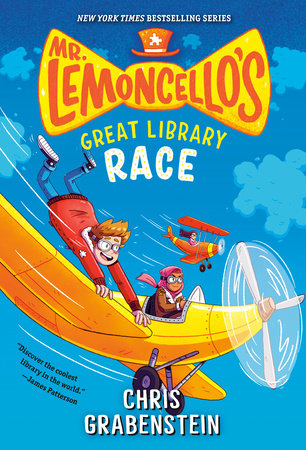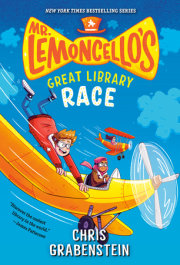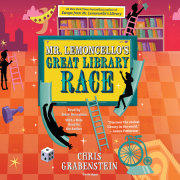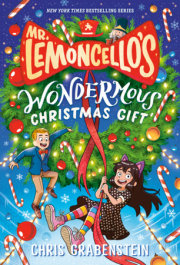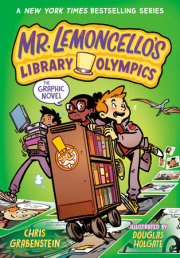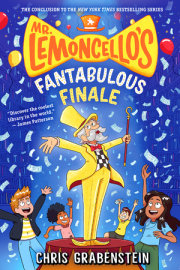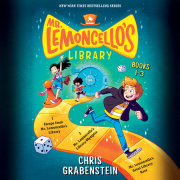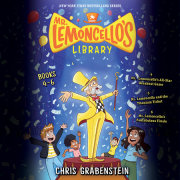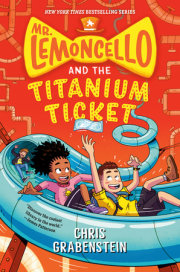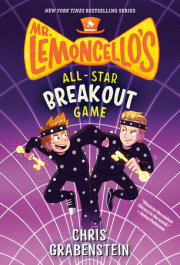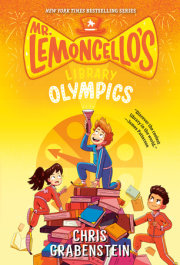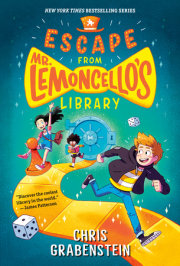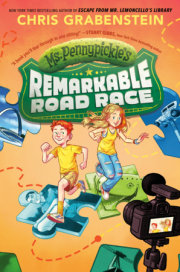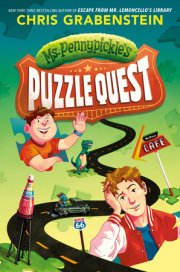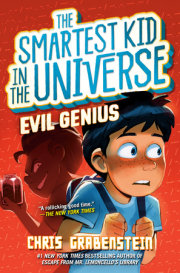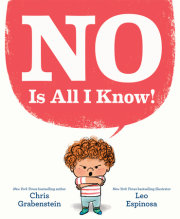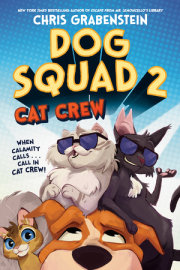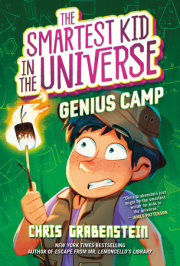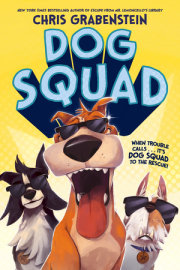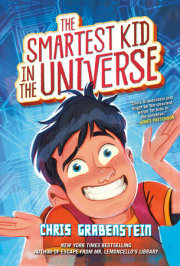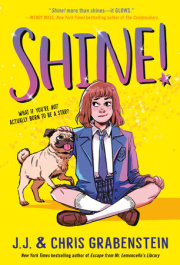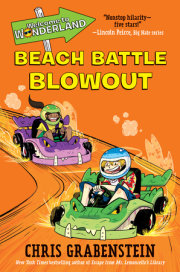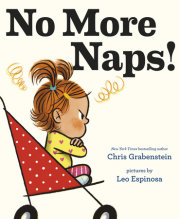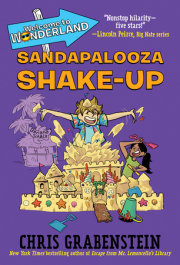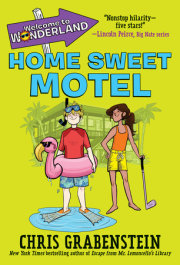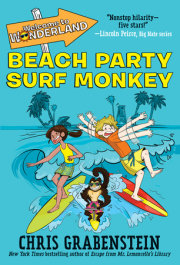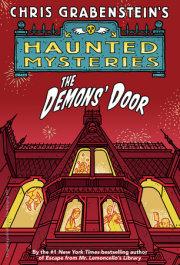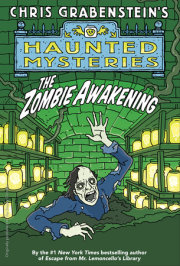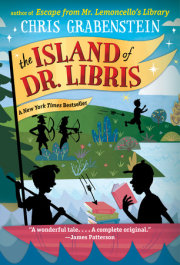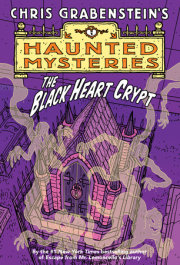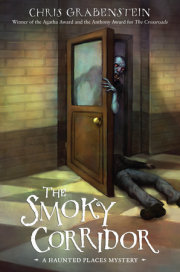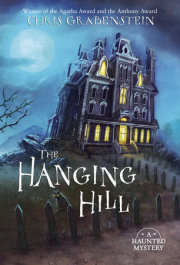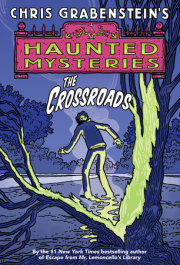This was a game Kyle Keeley refused to lose.
For the first time since Mr. Lemoncello’s famous library escape contest, he was up against his old nemesis, Charles Chiltington.
“Surrender, Keeley!” Charles jeered from three spaces ahead. “Chiltingtons never lose!”
“Except, you know, when they do!” shouted Kyle’s best friend, Akimi Hughes. She was ten spaces behind Kyle and couldn’t stand seeing Charles in the lead.
The life-size board game had been rolled out like a plastic runner rug around the outer ring of tables in the Rotunda Reading Room of Mr. Lemoncello’s library.
“The game’s not over until it’s over, Charles,” Kyle said with a smile.
He had landed on a bright red question mark square, while Charles was safe on “Free Standing.” A shaky collection of drifting holograms hovered over their heads, suspended in midair beneath the building’s magnificent Wonder Dome. The dome’s giant video screens were dark so they wouldn’t interfere with the ghostly green images creating what Mr. Lemoncello called a Rube Goldberg contraption—a device deliberately designed to perform a very simple task in an extremely complicated way.
Most Rube Goldberg contraptions involve a chain reaction. In Mr. Lemoncello’s Rickety-Trickety Fact or Fictiony game, a new piece of the chain was added every time one of the players gave an incorrect answer. If someone reached the finish line before all the pieces lined up, they won. However, if any player gave one too many wrong answers, they would trigger the chain reaction and end up trapped under a pointed dunce cap.
They would lose.
“Are you ready for your question, Mr. Keeley?” boomed Mr. Lemoncello, acting as the quiz master.
“Yes, sir,” said Kyle.
“Fact or fiction for six,” said Mr. Lemoncello, reading from a bright yellow game card. “At five feet four inches, George Washington was the shortest American president ever elected. Would you like to answer or do the research?”
It was a tough choice, especially since Kyle didn’t know the answer.
If he did the research, he’d have to go back one space
and lose a turn so he could look up the correct answer on one of the tablet computers built into the nearby reading desk.
But while he was researching, Charles might surge ahead. He might even make it all the way to the finish line.
On the other hand, even though Kyle didn’t know the answer, if he said either “fact”
or “fiction,” he had a fifty-fifty chance of being right and moving forward six spaces, putting him
in front of Charles, and that much closer to victory.
Of course, Kyle also had a fifty-fifty chance of being wrong and adding what might be the final hologram to the wobbly contraption overhead.
“Do the research, Kyle!” urged Akimi.
“Please do,” sneered Charles.
“Yo!” shouted another one of Kyle’s best buds, Miguel Fernandez. “Don’t let Chiltington get under your dome, bro. He’s just playing mind games with you.”
“Impossible.” Charles sniffed. “Keeley doesn’t have a mind for me to play with.”
“Uh, uh, uh,” said Mr. Lemoncello. “Charles, I wonder if, just this once, you might choose kind?” He turned to Kyle. “Well, Mr. Keeley? No one can make this decision for you, unless, of course, you hire a professional decider, but trust me—they are decidedly expensive. Are you willing to put everything on a waffle and take a wild guess?”
Kyle hated losing a turn when the whole idea was to
win the game. He hated going backward when the object was to move forward.
He studied the teetering collection of holograms suspended under the darkened dome. He looked at Charles, who was sneering back at him smugly.
“I want to answer, sir.”
“Very well,” said Mr. Lemoncello. “Let me repeat the question before the cucumbers I had for lunch repeat on me: At five feet four inches, George Washington was the shortest American president ever elected. Fact or fiction?”
Kyle took a deep breath. He remembered some teacher once saying people were shorter back in the olden days. So odds were that Washington was a shrimp.
“That, sir,” he said, “is a . . . fact?”
A buzzer
SCRONKed like a sick goose.
“Sorry,” said Mr. Lemoncello. “It is, in fact, fiction. At six feet three inches, George Washington was one of our
tallest presidents. It’s time to add another piece to our dangling-dunce-cap-trap contraption.”
Electronic notes diddled up a scale.
“Oh, dear,” said Mr. Lemoncello. “It looks like that’s the last straw!”
A hologram of a striped milk carton straw floated into place. It shot a spitball at a hologram of an old-fashioned cash register, which hit a button, which made the cash drawer pop open with a
BING! The drawer smacked a holographic golf ball, which
BOINKed down seven steps of a staircase one at a time until it bopped into a row of dominoes, which started to tumble in a curving line. The final domino triggered a catapult, which fired a Ping-Pong ball, which smacked a rooster in the butt. The bird
cock-a-doodle-dooed, which startled a tiny man in a striped bathing suit standing on top of a fifty-foot ladder so much that he leapt off, spiraled down, and landed with a splash in a wooden bucket, which, since it was suddenly heavier, pulled a rope that struck a match, which lit a fuse, which ignited a fireworks rocket, which blasted off, which knocked the dunce cap off its hook.
The holographic hat of shame fell and covered Kyle like an upside-down ice cream cone.
“Loser!” crowed Charles.
Everybody else laughed.
By taking a wild guess, Kyle hadn’t gone backward or lost a turn.
But he’d definitely lost the game!
Copyright © 2018 by Chris Grabenstein. All rights reserved. No part of this excerpt may be reproduced or reprinted without permission in writing from the publisher.

